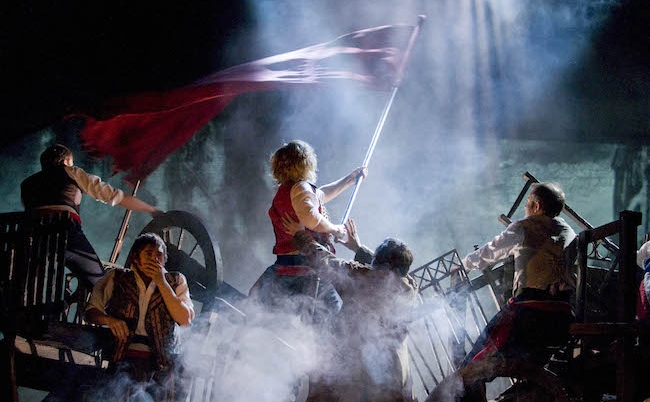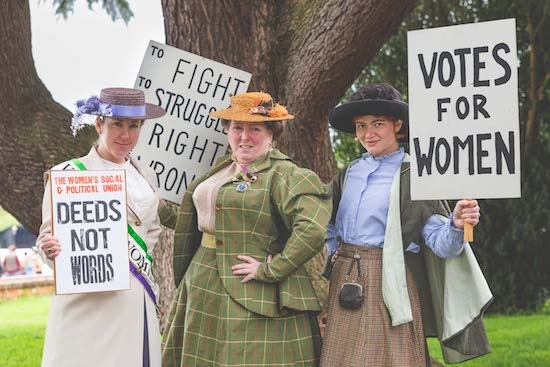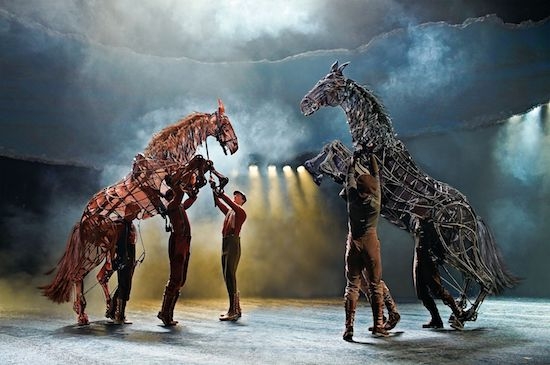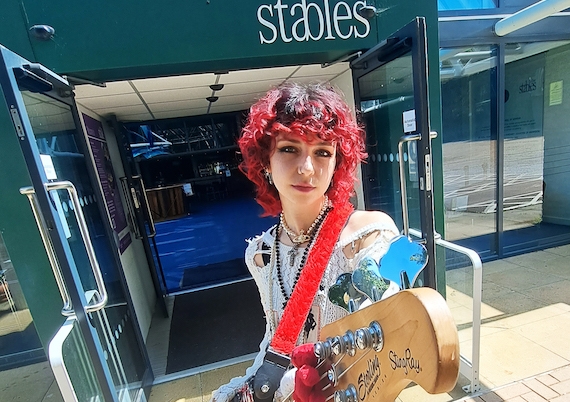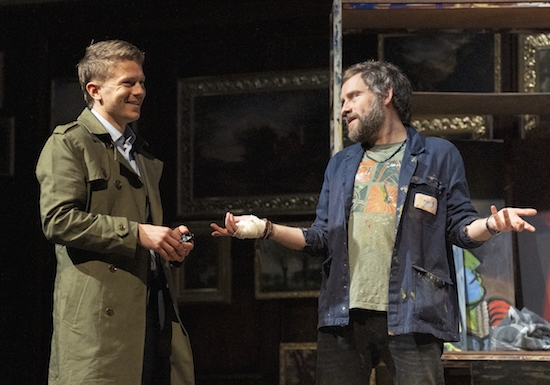The soul-stirring lyrics in musical phenomenon Les Misérables ask “do you hear the people sing?”.
Without a doubt, appreciative audiences at Milton Keynes Theatre will be responding with an exhilarated ‘yes’ and a standing ovation for the entire four-week run of the tremendous touring production, writes Georgina Butler.
Theatregoers storm the barricades for tickets to this show. I dreamed a dream that I would be invited to join the revolution and found myself in my own castle on a cloud at Milton Keynes Theatre’s gala press night.
The theatre is celebrating its twentieth anniversary this year and boasts a team of staff who are justifiably thrilled to have secured such a lengthy visit from Les Misérables – everyone in the building seems to be in awe of this stage sensation.
As one of the lucky revolutionaries invited for bubbles before the show, I was fizzing in anticipation well before the drinks were poured. Les Misérables is the longest-running musical in the West End and is consistently named as a global favourite alongside Cats and The Phantom of the Opera.
Although I’m familiar with Victor Hugo’s epic nineteenth-century novel, the blockbuster films, the classic soundtrack and amateur theatre interpretations, I have never seen the London production (it opened back in 1985, long before I was even a twinkle in my father’s eye!).
Having now seen the show performed on tour in all its glory, I can fully appreciate the scale of its success. But what can I possibly say that has not already been said over the last thirty-four years? At the end of the day, Les Misérables is musical theatre perfection.

The story follows Jean Valjean, a young man sentenced to nineteen years in a French prison for stealing a loaf of bread to feed his sister’s starving child. When Valjean, whose identity is reduced to that of ‘Prisoner 24601’, is released on parole, he experiences distrust from everyone he encounters. Embittered by years of hardship and desperate to survive during a time of great social and political unrest, Valjean resorts to behaving like the convict he has been branded as.
Fortunately, a priest shows Valjean some compassion and he is galvanised into starting his life anew, with faith and purpose. He breaks parole and changes his name. He becomes a factory owner and his factory foreman employs - and dismisses - the ill-fated Fantine. Later, Valjean finds out about Fantine’s lost daughter Cosette. He rescues and raises Cosette, witnessing her blossom into a young woman and fall in love. He even supports Cosette and her beau, Marius, through a revolution to better their future.
The (extremely) emotional journey sees us travel with Valjean as he redeems himself while constantly running from ruthless Javert, the police inspector who is determined to reincarcerate 'Prisoner 24601' for breaking parole.
Killian Donnelly is outstanding in the role of Jean Valjean. The character of Valjean carries the entire show. He is the constant presence at the centre of everything that happens, throughout a narrative of suffering that stretches over many years. He needs to be portrayed by quite the leading man - and Donnelly delivers.
Les Misérables is a sung-through musical, so all the dialogue is tunefully warbled.

This conversational crooning is punctuated by some of the most instantly recognisable, hauntingly beautiful songs in theatre. Donnelly’s vocal range allows him to belt out every rise and fall of the wide-ranging score with ease. He is not alone in this though; the voices of everyone in the company truly soar.
Each cast member demonstrates that we are witnessing the crème de la crème of singing – and acting – talent.
Katie Hall – who has previously performed at Milton Keynes Theatre in West Side Story (2014) and The Phantom of the Opera (2012) – gives a heart-breaking performance as desperate Fantine.
Her vocals are crystal clear and earnestly conveyed, and her body language is equally expressive. Hall’s conviction is utterly indisputable when she sings Fantine’s anguished solo, I Dreamed A Dream – the lament that comes when Fantine is left alone, unemployed and destitute. This is the moment you can first expect to need a tissue, and there are plenty more tearjerker moments to come.
The true love shown by Éponine (Tegan Bannister) for Marius (accomplished understudy Shane O’Riordan), who only has eyes for Cosette (sweet songbird Bronwen Hanson), is powerfully played by Bannister. Indeed, her moving rendition of On My Own will leave you wishing there was some way to change Éponine’s destiny, some way to shield her from her overwhelming feelings of unrequited love and dissuade her from returning to the barricade.
Juxtaposed against all the heartache and moral misery, the pantomime of the Thénardiers – those unscrupulous innkeepers whom Fantine naively trusts to care for little Cosette – provides some light relief. Monsieur and Madame Thénardier (portrayed by Martin Ball and Sophie-Louise Dann) delight in showcasing their wily ways whenever they can. Their renditions of clever comic lyrics about cheating customers, accompanied by slapstick clowning around, will have you simultaneously laughing at their antics and marvelling at the underlying ethics of the story.

The ensemble performers unite with operatic flair to sing of struggle and rebellion. Whether they are portraying toiling factory workers, prostitutes, pub patrons or the poor, the ensemble convincingly depicts the cruelty of society while showcasing astonishing vocal talent. Performed with sombre sincerity and patriotic passion, the songs in Les Misérables really could not be more rousing!
Moreover, Les Misérables accentuates what the “little people” can do and the rotating cast of children who play Little Cosette, Young Éponine and street urchin Gavroche all shine.
The spectacular set by Matt Kinley is inspired by Victor Hugo’s sombre watercolour paintings. It includes projections which add depth to the onstage action; as well as imposing scenery which deftly dances across the stage to speedily progress the narrative. Offset by atmospheric lighting by Paule Constable and a live orchestra under the direction of Ben Atkinson, it helps create an immersive theatrical experience.
Considering Les Misérables is a musical in which most of the main characters die, you still leave the auditorium filled with hope and inspiration. This is thanks to both the talent on the stage and the cathartic effect of feeling so many emotions in response to the timeless tale, music and lyrics.
Art brings us home to ourselves. Save your soul - escape to the theatre and be enthralled by Les Misérables.
> Les Misérables continues at Milton Keynes Theatre until Saturday, June 8 2019.
Click here for best availability.
Georgina Butler is a journalist, a dance writer and a dance teacher who specialises in teaching classical ballet. Visit https://georginabutler.co.uk/ and follow her on Twitter @GeorginaLButler and Instagram @glbdancewriter


